If you spend any time reading Kveller, you already know the incredible force that is Carla Naumburg, contributing editor, writer, clinical social worker, mother, and loyal friend extraordinaire. You probably also know that Carla is the author of the recently published “Parenting in the Present Moment-How to Stay Focused on What Really Matters,” in which she breaks through the exasperating barrier of impossible and impossibly out-of-touch parenting advice (sleep when your baby sleeps, anyone?) to offer suggestions about how we can slow down, focus, and start really connecting with our kids (and stop yelling so much). Carla graciously took some time out from writing her next book (see here!) to chat with me about how we can create more mental space–for ourselves and for our kids.
So, Carla. It’s 7:45 a.m. and I’ve already yelled at my kids four times. We are trying to get out the door to school. One of them falls to the floor and refuses to put on pants. I am shaking. What do I do?
I love this question, Adina, because I can totally relate to it. Here is what I suggest:
Stop whatever you are doing–just stop–and take two or three deep breaths. Putting your hands on a hard, flat surface can also help ground you.
Then, figure out what your priority is right now in this moment. Do you have to get out the door so you can drop the girls off and get to work or a meeting? Do you need to get the clothes on your daughter? Is there something else that needs to get done first?
Whichever situation you choose to focus on, get yourself calm first. This might take a minute or two, but it will save you time later. Then, wait for your daughter to get calm. This will happen more quickly if you’re calm. From there, you can talk to her.
Hmm. Getting calm. I am guessing mindfulness can help me do that?
Well, hopefully, yes. Many people come to mindfulness as the result of a spiritual quest, but for me it was entirely pragmatic. I just wanted to figure out how to stop yelling at my kids so often. Meditation helps me stay calmer in the first place, and my mindfulness practice also helps me calm down when I’m feeling stressed, frustrated, or angry.
There is a ton of parenting advice out there, and it’s hard to know what to believe. Mindfulness is different because it’s not about doing something specific, such as whether or not to sleep train your child. Rather, it’s about giving yourself enough breathing room so you can make a thoughtful decision rather than having a knee-jerk reaction. You’re more likely to make the best possible choice for you and your family when you can calm down and get present before you act.
So, what exactly is mindfulness?
A common, secular definition of mindfulness is “paying attention, to the present moment, with kindness and curiosity.” Most of us spend more time than we realize regretting, worrying, fantasizing, or remembering; we’re anywhere but here. And even if we are paying attention to what’s actually going on, we’re usually judging it or wishing it were different. The act of noticing without judging allows us to see situations clearly and respond more effectively and empathically to whatever is happening.
“Mindfulness is not hitting someone in the mouth.” Discuss.
This quote comes from a 5th grade boy named Tyran Williams who was interviewed for this New York Times article on a program teaching mindfulness in schools. What Tyran articulated so clearly is that a mindfulness practice can help us to get just enough headspace so we can make a more skillful choice in a difficult situation. We can choose not to hit someone in the mouth or yell at our kids, or whatever it may be. That’s the power of mindfulness.
An early title for this book was “Learning to Stay.” What does that mean?
My journey into mindfulness and mindful parenting started when I came across the following quote by the American Buddhist nun Pema Chodron:
“Stay… stay… just stay. Learning to stay with ourselves in meditation is like training a dog. If we train a dog by beating it, we’ll end up with an obedient but very inflexible and rather terrified dog. The dog may obey when we say ‘Stay!’ ‘Come!’ ‘Roll over!’ and ‘Sit up!’ but he will also be neurotic and confused. By contrast, training with kindness results in someone who is flexible and confident, who doesn’t become upset when situations are unpredictable and insecure.”
I read this and realized my biggest challenge in parenting: I had no ability to “stay” in the hard work of parenting. Every time things got stressful or annoying, I tried to escape by checking my phone, emptying the dishwasher, or scouring the cabinets for chocolate. When I couldn’t do that, I would just try to stop whatever was going on, often by yelling at my girls. None of those responses were particularly helpful, but I didn’t know how to change my habits, primarily because I didn’t know what the problem really was. I needed to figure out not only how to stay, but what to stay for. As I describe in the book, mindful parenting is about staying connected to our kids, staying grounded in ourselves, and staying present for as much as we can.
This makes so much sense to me, and I recognize these escapist behaviors in myself, too. But don’t we need to take care of ourselves? Maybe checking our phones isn’t escaping, but rather, a way to engage with the adult world for a split second.
You’re totally right. The reality is that none of us can parent on empty, and we really need to change the prevailing mindset about this.
Self-care gets short shrift in most parenting books. We’re told to “sleep when the baby sleeps” which generally means that we need to fit our self-care into the tiny nooks and crannies that pop up when our children are asleep or otherwise distracted (i.e. checking Facebook during that split second when things are hairy and you need a break).
Mindfulness practice not only helps reduce stress and improve sleep; it also allows us to make more skillful choices because we’re responding to the way things actually are rather than reacting to how we think they should be. So then, when we tune in to our own experience, we are more likely to recognize if we’ve reached a real breaking point, and we can make a conscious choice to take care of ourselves. Otherwise, we don’t even realize there’s a problem until our back goes out or we get a terrible cold, and we’re forced to take some time off.
I am guessing this is related to your thoughts on the importance of “single-tasking.” But who can really do that?
I love multi-tasking. A lot. Doing more than one thing at a time helps me feel productive and efficient. Unfortunately, it doesn’t actually work that way. Rather than doing two things at once, my attention is jumping from one thing to another, never fully focusing on any one thing. The end result is that I don’t really do anything to the best of my abilities, and I end up feeling more stressed than I would have otherwise. It’s quite insidious, actually–I think I’m making the best possible choices to get through my day, but I’m actually increasing my stress level.
For example: When my husband spends the day with our girls, I will often get home at the end of the day to find a messy house but happy kids. Alternately, when I am at home with my kids all day, I feel compelled to clean up everything as we go along, and to keep the house as tidy as possible. When Josh gets home, the house is neat and cleaned up, but I am stressed out and exhausted.
Lately, I’ve been trying to leave the dishes and the papers and the games out until the very end of the day, and then the girls and I clean them up together. The house is often quite a bit messier as a result, but I end up enjoying parenting so much more.
And probably, your girls are happier, too. Speaking of happy kids, do you have any tips to help us teach mindfulness practices to our children?
This is a great question! I’m actually in the process of writing a book for parents who want to teach mindfulness to their children. I interviewed nearly 30 parents who are doing this at home, and the one thing they all said was that it has to start with us. It’s hard to describe the value of mindfulness if we haven’t experienced it ourselves. In addition, as we become calmer, more connected, and more grounded, our children will respond accordingly. There are a ton of different activities you can do with your kids (the blog Left Brain Buddha is a great place to begin!), but the best place to start is with your own practice. I highly recommend “Real Happiness” by Sharon Salzberg for folks looking to learn more.









